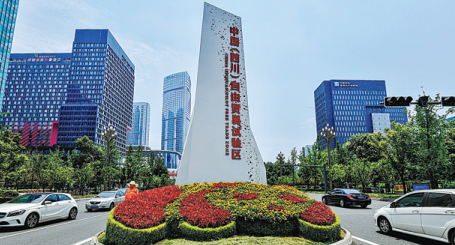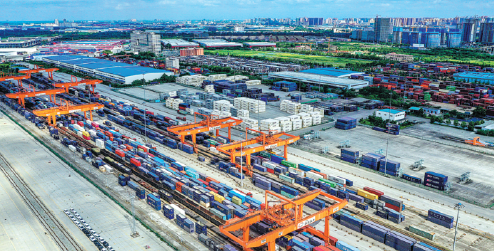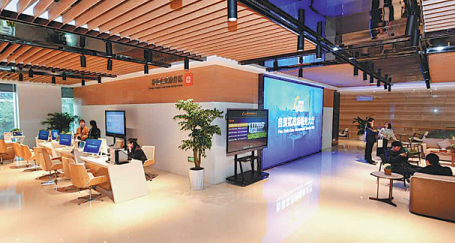Welcome to gochengdu.cn!
You need to accept our privacy and cookie policy to continue to browse our website. You can change your cookie settings through your browser.

A major part of China's (Sichuan) Pilot Free Trade Zone (FTZ), Chengdu's FTZ, has entered a new stage of reform.
Founded in 2017, the Sichuan FTZ consists of three parts; the Chengdu FTZ Tianfu New Area and Qingbaijiang railway port area, and the South Sichuan Port area in Luzhou.
In line with the innovation tasks of the Sichuan FTZ, the Chengdu FTZ has explored more than 430 innovative institutions. Thirteen of them have been replicated and promoted across the country, and 51 have been adopted in Sichuan province. The Chengdu FTZ has been ranked first among its peers in the innovation index of China's FTZs for three years running.
Institutional innovation
The State Council has approved the FTZ's innovations, such as supervising aquatic products, cargo transportation via planes and trains, and joint cargo transport by China-Europe freight trains. Local authorities also replicated them across the country.
In 2021, the FTZ's reform on managing the settlement of China-Europe freight expenses was among the country's fourth batch of best practice cases.
The FTZ has set national standards for the certified export of low-carbon products, the development of traditional Chinese medicine, and real estate development. Reforms, such as the integrated multi-dimensional transportation system, have helped Chinese standards align with international rules and norms.
Last year, the Chengdu Hi-Tech Industrial Development Zone reformed the registration of businesses in the FTZ.
"It used to take one week for us to prepare materials for business registration, but now it can be handled in two hours," said Lei Xia, a staff member at Chengdu Hongtugongju, a business management company.

A landmark of the China (Sichuan) Pilot Free Trade Zone stands among traffic in Chengdu.
The reform reduces interventions and subjective decisions during the approval process, encouraging more businesses to register, said an official from the FTZ. From April 2017 to February 2022, official data show that Chengdu's FTZ had more than 183,800 registered businesses, with an investment of more than 1.8 trillion yuan ($283.91 billion). Of them, 1,655 are foreign-funded businesses, contributing an investment of 178.82 billion yuan.
Trade assistance
Located at the junction of the Belt and Road Initiative and the Yangtze River Economic Belt, Chengdu has used its location to develop international aviation, railway stops, and ports to encourage trade.
Last June, Chengdu Tianfu International Airport was opened, making Chengdu the third city in China to have two international airports. Chengdu Shuangliu International Airport has launched 131 international routes, 15 of them for cargo. Its passenger and cargo volume ranked first in Central China.
In 2021, the Chengdu airport bonded logistics center opened a new type of cross-border e-commerce store to boost the consumption of imported merchandise.
The e-commerce business is based on the FTZ's preferential policies and location advantage, which has nearby warehouses to ensure quick deliveries, officials said.
According to local officials, the business has mobilized resources at home and abroad and coordinates online and offline platforms in a bid to offer a superior shopping experience on cross-border e-commerce platforms.
Meanwhile, Chengdu's railway port has opened routes to 69 foreign and 25 domestic cities, boosting the efficiency of international logistics for further opening-up.

Chengdu International Railway Port holds thousands of containers in Chengdu.
Coordinated development
On Jan 1, 2021, the China-Europe Railway in Chengdu and Chongqing was launched. Operating under a unified brand and name, they were the first cross-provincial China-Europe freight trains in the country. Last year, the trains ran more than 4,800 trips, accounting for nearly 30 percent of the country's total.
Since the launch, logistics departments and companies from Chengdu and Chongqing have entered close cooperation. The two sides have set up a mechanism for sharing information and collaborating on monthly plans and a unified price system.
The cooperation between Chengdu and Chongqing has also extended to electric ports, which handle information relating to logistics, customs, and tax, among others.
In early March, the local authority gave the green light to an electronic port project of China Construction Bank Chengdu Qingbaijiang branch in the Qingbaijiang railway port area of the FTZ.

Staff members at the center for administrative affairs in the Chengdu Hi-Tech Industrial Development Zone in the Chengdu FTZ.
The project is an official result of the integrated development of Chengdu and Chongqing, said local officials. The project is developed by China Electronic Port Center and China Construction Bank to help enterprises conduct one-stop electronic port applications and financial business.
One of the beneficiaries is Chengdu Qingtie, an international trade company in the Qingbaijiang district.
"We have a branch in Chongqing. We used to travel to Chengdu and Chongqing to deal with clients, but now all that can be handled in Qingbaijiang. That helps save costs and increase the company's operational efficiency," said a financial manager of the company.
The project is a business and service that helps to improve the business environment under the cooperation of customs and related banks in Chengdu. Local officials said it would help the integrated development of China-Europe freight trains in Chengdu and Chongqing.
With the development of the Chengdu-Chongqing economic circle, FTZs in Sichuan and Chongqing will have closer and more open cooperation, they added.
Edited by Zhu Haiyue
Source: China Daily